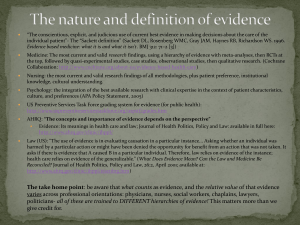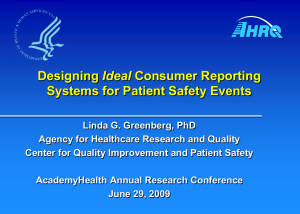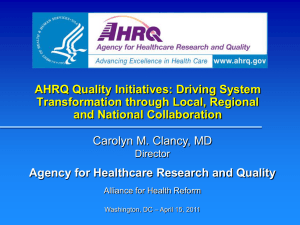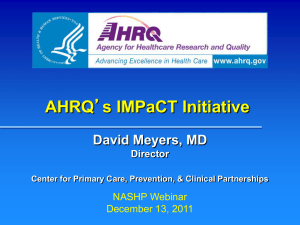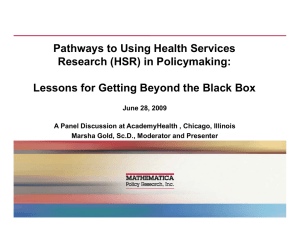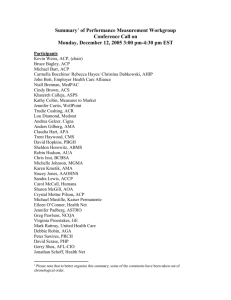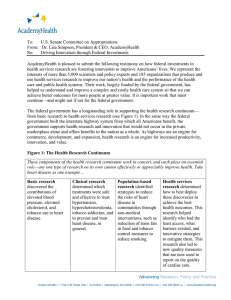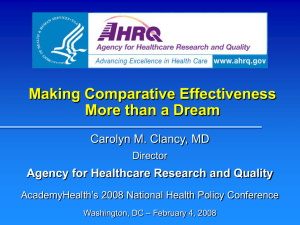D tif i th G t P
advertisement
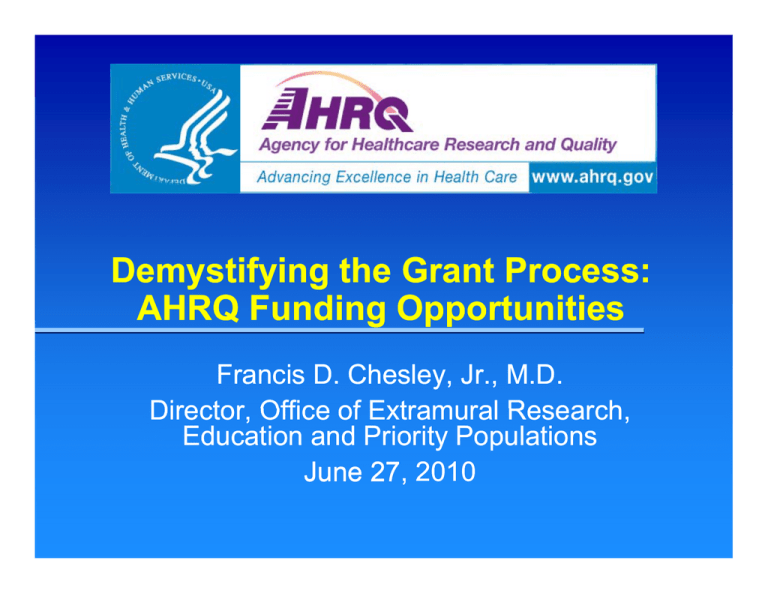
D Demystifying tif i the th Grant G t Process: P AHRQ Funding Opportunities Francis D. Chesley, Jr., M.D. Director Office of Extramural Research Director, Research, Education and Priority Populations June 27,, 2010 AHRQ Q Mission and Vision AHRQ Mission To improve the quality, safety, efficiency, y, and effectiveness of health care for all Americans AHRQ Vision As a result of AHRQ's efforts, American health care will provide services of the highest quality, with the best possible outcomes, at the lowest cost www.ahrq.gov HHS Organizational g Focus NIH CDC AHRQ Biomedical research to prevent, diagnose and treat diseases Population health and the role of community--based community interventions to improve health Long-term and Longsystemsystem y -wide improvement of health care quality and effectiveness AHRQ Research Focus: H How it Diff Differs Patient Patient--centered, centered not diseasedisease-specific Dual Focus -- Services + Delivery Systems Effectiveness research focuses on actual daily practice, not ideal situations (“efficacy”) AHRQ mission includes p production and use of evidence--based information evidence FY 2010 Budget Highlights: New Resources, Resources Ongoing Priorities $397 million allocation for FY 2010 represents a $25 million increase over FY 2009 MRSA Research: $9M Prevention P ti and dC Care M Management: t $15 $15.9M 9M Comparative Effectiveness Research: $21M Investigator Investigator--Initiated Research: $23 $23.6M 6M Medical Liability Reform Demonstrations: $25M HAI Prevention Activities: $25 Health IT: $27.6M Medical Expenditure Panel Survey (MEPS): $58.8M Patient Safety: $90.6M AHRQ’s Fiscal 2011 Budget Proposal Obama Administration proposed FY 2011 budget includes $611 million for AHRQ – up from $397 million in FY 2010: – $286 million for patientpatient-centered health research (aka CER), up $261 million over the FY 2010 budget – $32 million for health information technology research a $4 million increase from FY 2010 research, – $65 million for patient safety research, including $34 million to reduce and p prevent healthcarehealthcareassociated infections AHRQ Q Portfolios Value – Goal: Support the development of health care activities that help reduce unnecessary waste while improving quality Comparative Effectiveness Innovations/Emerging Issues Innovations/Emerging I ti /E i AHRQ Issues – Goal: Identify y and support pp ideas and projects that have the potential for highly innovative solutions to health care challenges Prevention and Care Management Patient Safety y Value Health IT HHS Framework for CER Evidence Generation Horizon Scanning Evidence Need Identification Evidence Synthesis Strategies Interventions Conditions P Populations l ti Dissemination Translation Research Platform Infrastructure – Methods Development – Training Improvements in Health Care An Unprecedented p Investment Allocations for the $1.1 billion in comparative effectiveness research funding in the American Recovery and Reinvestment Act off 2009: Research Data Infrastructure Dissemination and $681M (62%) $268M (24%) $132M (12%) Adoption Administrative support, inventory, e al ation evaluation $19M (2%) 21st Century y Health Care: Training g AHRQ has allocated $20 million in Recovery Act funding for career development of clinicians and research doctorates focusing on comparative effectiveness ff ti research. h Examples: E l – NRSA Postdoctoral Comparative Effectiveness Development Training Award (T32) Two years of supervised study and research for two cohorts of clinical and research doctorates – Mentored M t d Clinical Cli i l Scientists S i ti t Comparative C ti Effectiveness Development Award (K12) Three y years of supervised p study y and research for one cohort of clinical and research doctorates Grant Opportunities pp Pre and Postdoctoral Training – NRSA Institutional Training Programs (T32) – NRSA Predoctoral Fellowships for Underrepresented Minority Students (F31) – NRSA Postdoctoral P td t l Fellowships F ll hi (F32) – Dissertation Grants (R36) Career Development Awards – Mentored Clinical Scientist Awards (K08) – Mentored Research Scientist Development Award (K01) – Independent I d d t Scientist S i ti t A Awards d (K02) Mentored Research Scientist Awards ((K01)) Audience – research trained doctorates (e.g., Ph.D., Sc.D., Dr.P.H.) who require mentoring and have potential to develop into independent investigators Duration -- 3 to 5 years years, nonrenewable Level of Support -- $90,000 annually, plus fringe benefits and research development support up to $25 000 $25,000 Mentored Clinical Scientist Awards ((K08)) Audience -- clinical doctorates (including those in patientpatient-oriented research) who require mentoring and have potential to develop into independent investigators Duration -- 3 to 5 years years, nonrenewable Level of Support -- $90,000 annually, plus fringe benefits and research development support up to $25 000 $25,000 Independent Investigator Awards ((K02)) Audience -- promising new clinical and nonclinical investigators who are out of training 5 years or less, with demonstrated need of intensive research focus Duration -- 3 to 5 years, nonrenewable Level of Support -- $90,000 annually, plus fringe benefits, travel, justified educational expenses Special Emphasis for Career p Development AHRQ Announces Interest in Career Development (K01, K02, K08) Grants focused on Health Care Associated I f ti Infections in i Ambulatory A b l t C Care S Settings tti AHRQ Announces Interest in Career Development (K01 (K01, K02 K02, K08) and Dissertation (R36) Grants focused on Health ea t Information o at o Technology ec o ogy ((IT)) Special Emphasis Notice (SEN): AHRQ Announces Interest in Grants Focused on Health Risk Assessment in Primary Care Settings Ongoing g g Research Priorities PA PA--09 09--071 AHRQ Health Services Research Demonstration and Dissemination Grants (R18) PA PA--09 09--070 AHRQ Health Services Research Projects (R01) PAR PAR--08 08--136 Researching g Implementation p and Change While Improving Quality (R18) PA PA--06 06--448 448AHRQ AHRQ Small Research Grant Program (R03) Policy y Relevant Topics p See FOAs for specific priorities, but also Advancing the science of how organizational structure, process reengineering and behavioral incentives can improve outcomes Improving delivery system performance on quality and other outcomes Advancing implementation and spread off best b t practices ti Engaging Federal Staff in the Grant Process Importance p of Concept p Papers p – Alignment with agency priorities – Link to specific FOA – PO connection Next Steps for Applications in the Competitive Range – Submitting a summary statement response – Resubmission vs. waiting AHRQ Funding Decisionmaking Process – Second level review – AHRQ Senior Leadership Team (SLT) – Scientific merit merit, program priorities, priorities & balance Tips p for Success Know Electronic Application Process (424 R&R) Know the Funding Agency and Staff Understand Agency Budget & Research Priorities Know the Grant Mechanisms Know the Grant Process and Key Changes Contact Information AHRQ WEBSITE www.ahrq.gov qg F Francis i D D. Ch Chesley, l JJr., M M.D. D (301) 427427-1521 Francis.Chesley@ahrq.hhs.gov Questions ?
